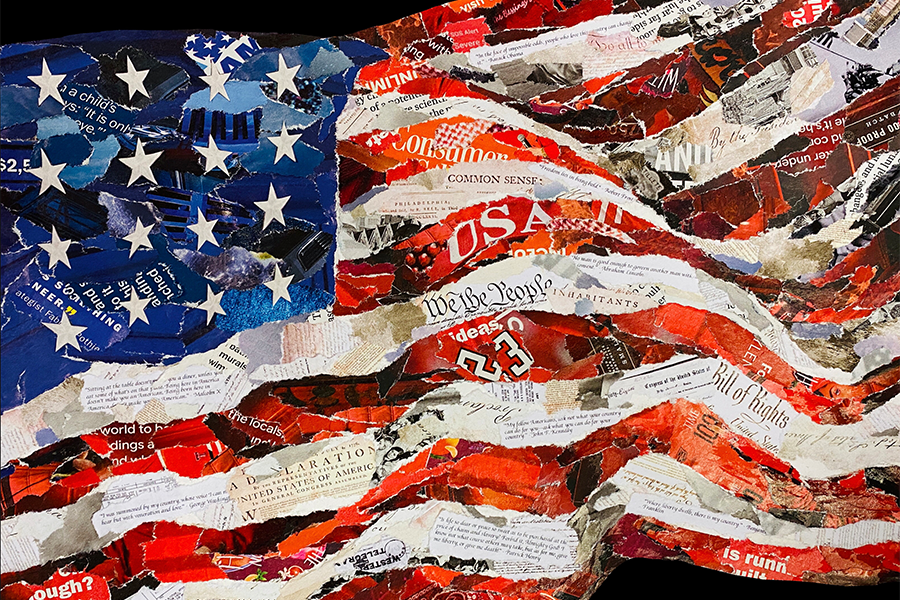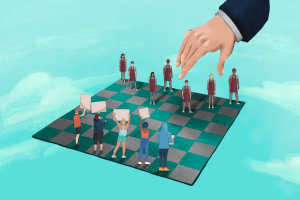Toeing the line between patriotism and nationalism
The American flag, once a symbol of national pride, shifted to bear an additional message of “America first,” showing the emergence of a gray area between patriotism and nationalism.
February 6, 2023
Waving flags with stars and stripes, the scent of hotdogs wafts from a grill and a dazzling display of fireworks greet a celebration of a nation’s birth. National pride and unity take center stage. The Fourth of July is one holiday where Americans join together in patriotism, a cherished sentiment in many parts of the U.S.. In recent years, however, the very patriotism that binds the nation together has become murky as dissenting political factions have claimed this word for themselves, tearing communities apart as they invest in their own interpretations of patriotism.
According to Oxford Languages, patriotism is defined as the devotion to and vigorous support for one’s country. Without some level of patriotism, a country can seem apathetic toward its own ideals. Thus, countries strive to inspire patriotic actions among their citizens to avoid turmoil, present a unified front and push forward new policies. Lines become blurred when the very idea of patriotism is skewed. Some have interpreted patriotism as unwavering support for one’s country without criticism of its actions or stance on any topic. However, this definition actually aligns with nationalism, an extreme belief in a country’s supremacy, and has been misinterpreted by many to be a patriotic value.
While nationalism bears a negative connotation, it is a sentiment that has pervaded recent conservative politics, marked by a yearning for past, unchanged versions of America. This inflexibility creates divisions between the younger progressive generations and older conservative groups. America is often described as “the melting pot” of cultures and ideas, and the change diversity brings, while difficult, is not inherently bad. Patriotism lies in a desire to improve a nation and also to appreciate what is already there.
“I feel like Generation Z has a disconnect with America,” senior Priscilla Leang said. “It’s easy to get wrapped up in the momentum of advocating for change — which is great — but it also causes us to overlook some of the core principles America already offers us.”
As American politics have become increasingly polarized, though, patriotic values from one side of the political spectrum may appear to be the antithesis of what the other side advocates.
“There are people who deep in their heart believe that they are doing the right thing to add value to their country. And on the other side of the issue, people are doing the exact opposite, but have the same core belief,” AP Government and Politics teacher Jeff Bale said.
Political turmoil in the U.S. has shifted the notion of patriotism for many. For instance, the American flag for some went from a mark of national pride to a flag that bore the message of “America first,” most notably under former President Donald Trump’s presidency. In one of his rallies, Trump called himself a nationalist, reinforcing in his constituents that his presidency embraces divergent views of American values.
The idea of “America first” soon became a hotly debated topic between Republicans and Democrats, showing itself in anti-immigration policies, riots, tariffs and more. One significant case is the Capitol Hill insurrection on Jan. 6, 2021. While the incident could look like an isolated event, the root of the issue lies in a narrow view of patriotism and distaste for change. In a pattern of extreme conservatives fighting for an older-fashioned America while liberals seek to regain political power, politicians struggle to compromise amid political polarization.
Professor Giovanni Peri from the University of California, Davis, an economist specialized in analyzing the economics of immigration, discussed how nationalistic ideas have led to stagnant immigration policies that eventually harm countries economically. For the past few decades, immigration policies on high-skilled workers have not changed in the U.S., despite the higher demands and opportunities these people bring. Especially with the filibuster in place, talks in Congress updating legislations to reflect the changes in America have been nearly impossible.
In Europe, which is currently experiencing its own surge of immigration, nationalistic and right-wing groups in Britain, Germany, Sweden, Italy, France and Spain have appealed more to the voter base through calls to defend the national identity of the people.
“From the economic point of view, the benefit of immigration will be large,” Peri said. “But because of the strength of nationalistic views, most European governments and the U.S. are in a situation in which they want less, rather than more immigration, and these will clearly come at an economical cost for these countries.”
Nationalistic media has often pushed forward more domestic recruiting, and in places where people have limited sources, it is easier for nationalism to spread. Peri notes the importance of educating the general public about nationalism and the positive effects immigration can bring. His studies found that, on average, college-educated people were more likely to be open to immigration, finding a balance between patriotism and nationalism.
In California, many struggled to embrace shifts in U.S. population as the population of white Americans dropped below 50% in the 1990s. A string of anti-immigration policies followed, but gradually, communities realized and accepted changes in society. Today, California remains one of the most progressive, wealthy and economically successful states in the country and has the highest percentage of foreign-born citizens.
Setting aside recent disputes, patriotism regularly serves as the nation’s unifier. In extreme cases of tragedy, such as the terrorist attacks of Sept. 11, 2001, true patriotic values and protection of one’s homestead brought the nation together.
“Sometimes, when you have these calamities, it actually brings out the best of what I would call ‘patriotism,’ where it’s shared sacrifice, and belief in a larger good of the country,” Bale said. “That’s true patriotism, and there really is a positive value for that.”
Whether it be from an economic or political standpoint, it’s important to clarify the notions of patriotism and nationalism so that Americans can understand both ideas and feel comfortable being “patriotic”. Patriotism can unite individuals under a shared spirit of love for one’s country, but when it begins to bear nationalistic undertones, it becomes detrimental. Moving away from nationalism through embracing change and educating the general public on these concepts may lead to more accepting generations, which will further the strength and unity of the U.S.






























































